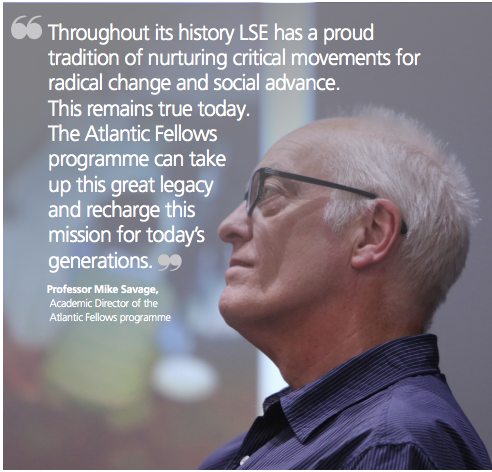A Global Response to Confront Rising Inequalities
Resource type: News
LSE Impact | [ View Original Source (opens in new window) ]
On 1 June, LSE launched the Atlantic Fellows programme at the International Inequalities Institute. Co-Director Professor Mike Savage, the initial Academic Director of the Atlantic Fellows programme, discusses why the 20-year initiative — made possible by The Atlantic Philanthropies — is such a landmark moment.

By Mike Savage, Academic Director of the Atlantic Fellows programme
I often think that the challenges linked to growing inequalities are rather like those of climate change — the trends are slow but incremental and potentially devastating in the longer term. The growing gap between rich and poor which we are seeing in many parts of the world poses huge challenges to our social fabric. It means that an elite of senior managers and politicians are increasingly detached from most people’s lives, and the decisions they make are based on information from narrow social circles and limited perspectives.
 Subsequently the majority of the population feel relatively powerless, and with limited capacity to shape their futures. It generates insecurity. Most fundamentally, it means that many of the values which people hold dear — in democracy, meritocracy, tolerance and mutual respect — are in practice increasingly put under pressure in a society where resources are increasingly unevenly distributed.
Subsequently the majority of the population feel relatively powerless, and with limited capacity to shape their futures. It generates insecurity. Most fundamentally, it means that many of the values which people hold dear — in democracy, meritocracy, tolerance and mutual respect — are in practice increasingly put under pressure in a society where resources are increasingly unevenly distributed.
Currently the social sciences still remain organised largely in disciplinary silos, and the challenge of inequalities straddles disciplines and requires expertise, experience and insights from all the social sciences: economists, anthropologists, political scientists, sociologists and others. When we created the International Inequalities Institute (III) at the School last year, supported by philanthropic gifts, it was a significant step in bringing a multidisciplinary approach to tackling global inequalities by utilising the expertise of LSE’s academics across the social sciences.
Inequalities are multidimensional, and narrow policy fixes — even radical ones — are unlikely to be sufficient to address the challenges involved. There is a need for future leaders to be informed by new research across a wide range of disciplines in order to address the challenge of escalating inequalities across the globe.
This is why the Atlantic Fellows programme is so profoundly exciting: embedded in the III and drawing on the LSE community as a whole, it is uniquely well placed to make a huge contribution by offering a comprehensive, and wide-ranging platform that will create a global network of 600 leaders over the next two decades equipped to confront and overcome perhaps the major social problem of our time.
Atlantic Fellows will be committed to tackling inequality and able to draw on the best academic and practical experience in the world to enhance their skills, contacts and confidence. We are grateful to The Atlantic Philanthropies for sharing our commitment to this vision in the most generous terms imaginable.
As Sir John Hills and I formulated what the programme would look like within an LSE context, discussing with our colleagues across the School and with Atlantic how we would fully utilise LSE’s extraordinary intellectual capital, everything centred on the people it would seek to engage as participants: who would have the capacity to become leaders in a network of talented people tackling inequalities?
We asked ourselves what we would want to experience if we were participating at different stages of our careers. It was abundantly clear that we would want to feel part of a cohort of like-minded Fellows, people who want to change the world, and who feel supported by leading academics, professionals and leaders to develop our confidence and knowledge. Personally, I would want to feel that I was familiar with the best and most important research addressing the causes and implications of inequalities, and that I had shared experiences about how to address these challenges.
As such, when we launch with a phased application process later this year, we will be aiming to empower skilled, experienced, and talented people who would otherwise be excluded or marginalised from research led education, so that they feel able to challenge inequities as part of a larger community of Atlantic Fellows.
The first team of visiting Fellows will join the III in the first half of 2017, with the first cohorts of residential and non-residential Atlantic Fellows joining in the summer and autumn of 2017. It will be a great privilege to use my teaching and research experience to help shape this amazing opportunity.
We firmly believe we are creating something special — and we are indebted to The Atlantic Philanthropies for the visionary gift that has made this 20-year project possible. We share a commitment to educating and supporting over that period a cadre of leaders who want to challenge inequality, through activism, through grass roots campaigning, through art, creativity and storytelling. Atlantic’s £64.4 million investment in LSE and recognition that we can help to deliver a lasting legacy that will promote opportunity, fairness and dignity on a global level across generations is something of which I hope the entire School community can be proud. This is an example of philanthropy with a purpose, one consistent with the very traditions of LSE.
Throughout its history LSE has a proud tradition of nurturing critical movements for radical change and social advance. This remains true today. It would be fantastic if the Atlantic Fellows programme can take up this great legacy and recharge this mission for today’s generations. I hope we can become a beacon of how the social sciences can be a progressive force in the 21st century world.
The Atlantic Fellows programme at the International Inequalities Institute is an ambitious 20-year programme designed to build a global community of leaders dedicated to changing policy, practice and public dialogue around inequalities.It has been created with a grant of £64.4m ($91m) from The Atlantic Philanthropies — a longstanding and generous supporter of LSE. This is the largest philanthropic donation in the School’s history.
Developed and led by III co-Directors Professors Sir John Hills and Mike Savage, the programme will train the next generation of leaders seeking to influence and facilitate changes in global policy and practice to enable greater equality, opportunity and outcomes for all. It is expected that well over 600 Atlantic Fellows will be developed across geographic and disciplinary boundaries over the duration of the programme.
LSE Director Professor Craig Calhoun said: “No theme has been more central to the work of LSE throughout its history than addressing and trying to moderate inequality. No issue is more important to the UK or the world today. This remarkable grant will enable LSE’s new International Inequalities Institute to scale up faster, join students and researchers across departmental lines, and prepare generations of engaged practitioners to have an even more profound impact.”
Christopher G. Oechsli, President and Chief Executive Officer at The Atlantic Philanthropies said: “From its inception, Atlantic has invested in people and in their vision and ability to realise a better world. In our final year of grant-making, we’re making our largest philanthropic investment ever, in people. Our vision for the Atlantic Fellows is to connect and empower a new generation of people who are committed to working together, across disciplines and borders, to build fairer, healthier, more inclusive societies. LSE’s values and commitment to excellence coupled with the International Inequalities Institute’s renowned leadership, multi-disciplinary approach, and ability to translate leading academic thinking into real policy and practice, make them an ideal partner and host for this programme.”
Find out more about the Atlantic Fellows programme at lse.ac.uk/atlanticfellows
Learn More
- Atlantic Fellows Programme at the International Inequalities Institute at London School of Economics
- Atlantic Fellows website
The London School of Economics and Political Science is an Atlantic grantee.